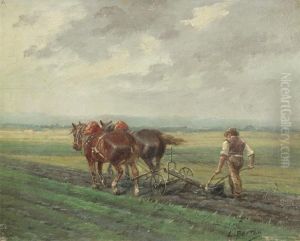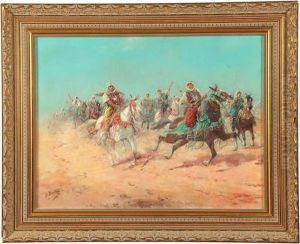Louis Berton Paintings
Louis Berton, born in 1821 and deceased in 1866, was a French artist whose life and career spanned the heart of the 19th century, a period rich in artistic evolution and revolution in Europe. Though not as widely recognized as his contemporaries, Berton's contributions to the art world during this vibrant era were noteworthy. His works, primarily focused on painting, encapsulate the transition from Romanticism to Realism, reflecting the shifting tastes and societal changes of his time.
Berton was trained in the traditional academic style, which emphasized classical subjects and techniques, but his artistic journey was marked by exploration and experimentation. Throughout his career, he displayed a keen interest in capturing the reality of the human condition, often depicting scenes of daily life with a poignant realism that prefigured later developments in French art. This inclination towards realism, combined with a subtle use of color and light, distinguished his work from that of his peers who remained more closely aligned with neoclassical or romantic sensibilities.
Despite his talents and contributions, Louis Berton's career was often overshadowed by the luminaries of his day, such as Eugène Delacroix and Jean-Auguste-Dominique Ingres, whose works defined the artistic movements of the era. Nevertheless, Berton's paintings offer a unique glimpse into the socio-cultural undercurrents of 19th-century France. His depictions of ordinary people and everyday situations resonate with a sincerity and depth that afford them a special place in the annals of French art.
Berton's legacy, though modest in comparison to the giants of his time, is preserved in various French museums and collections, where his works continue to be studied and appreciated by art historians and enthusiasts alike. His life and oeuvre serve as a testament to the rich tapestry of 19th-century European art, illustrating the diversity of paths and perspectives that contributed to the era's artistic achievements. Louis Berton's death in 1866 marked the end of a career that, while not monumental, was undeniably significant in its authentic portrayal of contemporary life and its subtle challenge to the artistic norms of his day.



